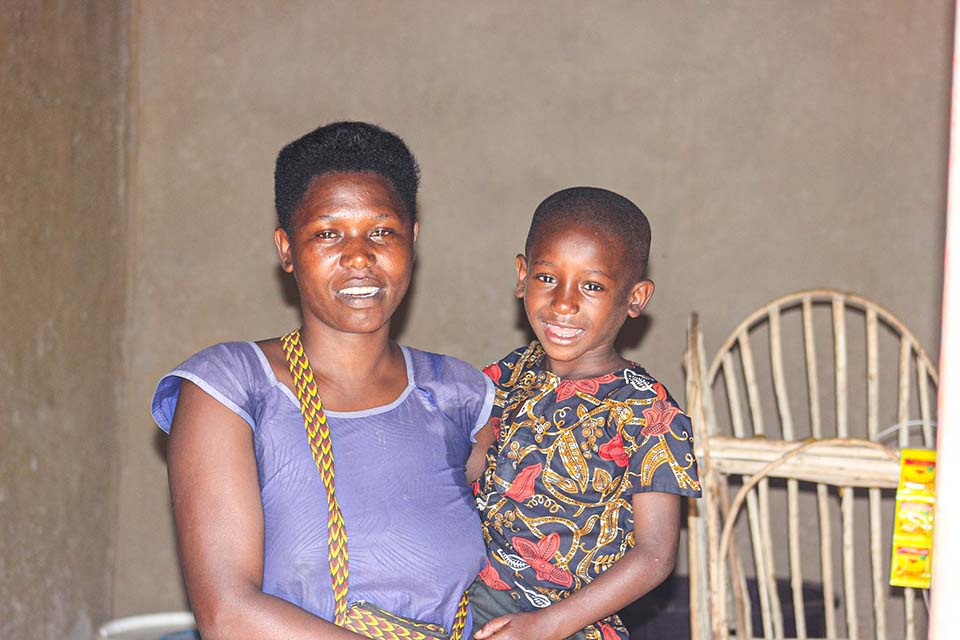
Improving Nutrition and Resilience in Rwanda
At her shop in Rwamagana, Rwanda, Laetitia Niyonsaba sells cabbages, bananas, maize and sorghum. With every item she sells, she smiles as she counts her earnings. Her three-year-old son, Daniel, hugs her when he comes from school.
Daniel attends the local Nurturing Care Hub established by the US Agency for International Development-funded Inclusive Nutrition and Early Childhood Development project known in their community as the Gikuriro Kuri Bose. Back home, Daniel receives well-balanced meals of potatoes, fish, beans, fruits and vegetables prepared by his mother. Four years ago, Laetitia’s husband left, and she struggled to feed her children.

Laetitia Niyonsaba and her son, Daniel. Daniel recovered from malnutrition following Laetitia’s participation in a local savings group.
Photo by Fred Hirwa for CRS
“When my husband left me, I felt hopeless, and I thought my life was ending,” Laetitia says. “I spent time being lonely, and desperately thinking where my children will find their next meal.”
She couldn’t afford school fees for her two older children. While his mother spent her days seeking work, Daniel became malnourished.
As part of the Gikuriro Kuri Bose program, Laetitia was encouraged in her village by a community health volunteer to join a CRS Savings and Internal Lending Community attended by parents like herself. SILC groups were established by the Gikuriro Kuri Bose project to build parents’ resilience and food security. By accessing loans, they can start businesses and purchase nutritious food for their families. Laetitia attended and even with her limited means, she was able to save a little money each week.
After some time, Laetitia was able to take out a loan from her SILC group. She used the money to start her business, purchasing cabbages, bananas, maize and sorghum in bulk to re-sell for profit.
From the first profit she made, she rented a shop and her business took off. From that time onward, her business grew. Profits from her business have changed her life. Her children now eat healthy, nutritious meals.
Laetitia has since increased her savings contributions to the SILC group to and now has a share in the SILC group.
“I never dreamt to have the life I have now,” Laetitia says. ”… The malnutrition issue for my son is now solved and my current thoughts are focused on how to expand my business and how my children can have a greater future.”
Laetitia is regularly visited by a trained community health worker who advises her and continues to educate her on nutrition and child health to ensure Daniel never becomes malnourished again.
In all the villages where the project works, parents learn about improved nutrition, preparation of a balanced diet, and how to prevent stunting and malnutrition among their children. They attend a village nutrition school where they learn about food preparation and rehabilitating malnourished children.
The Inclusive Nutrition and Early Childhood Development project or Gikuriro Kuri Bose is a 5-year USAID-funded program to improve the health, nutritional status, and well-being of women of reproductive age and children under six years of age. It emphasizes the first critical first 1,000 days of a child’s life, encourages inclusion of children and adults with disabilities and improves positive parenting and child development. The program is implemented by a consortium led by Catholic Relief Services, and four consortium members that include Humanity Inclusion, UMUHUZA, Three Stones International, University of Global Health Equity and four sub-partners: CARITAS, African Evangelistic Enterprise, Young Women Christian Association, Duharanire Amajyambere y’Icyaro - Association pour le Développement Rural Intégré.

